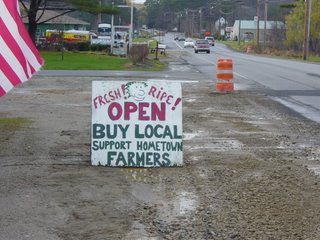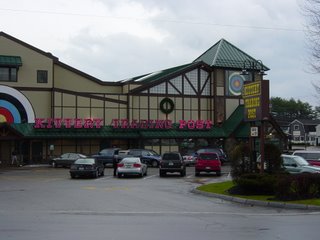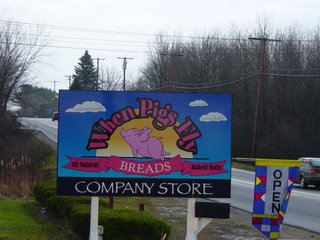 [Holding the line against chain stores]
[Holding the line against chain stores] [Not a Maine-owned business in sight!]
[Not a Maine-owned business in sight!]
 [The Kittery Trading Post--outfitting yuppies for their next shopping adventure]
[The Kittery Trading Post--outfitting yuppies for their next shopping adventure]
 [York Harbor, exuding old money and its stately homes along the water's edge]
[York Harbor, exuding old money and its stately homes along the water's edge]

[Maybe pigs really do fly--if not, its one kick-ass brand of locally baked bread]
From Kittery, up the coast-
Crossing the Piscataqua River, from New Hampshire, back into Maine, I rarely leave the Maine Turnpike and travel coastal Route 1. Friday morning, on my way back from a Thursday night show in Cambridge, I decided to spend some time along this coastal roadway, which has a storied history, although it was painfully obvious to me that Maine’s southernmost section of this auto route has lost any sense of uniqueness.
I have a new book project in the works, which will once again be my own skewered take on Maine, as I see it. Planning to take the day off, Friday, I made the decision to catch the show and rather than head home, I got a room in Portsmouth and hoped to spend some time scouting York County for some ideas. Armed with a camera, I took some photos as I meandered north, on my way back home.
I won’t go into great detail here, but I wanted to catch a Texas-based band called Centro-matic, who were playing at the Middle East in Cambridge. I’ve blogged about it in considerable detail over at my own MySpace page. I created the page to capitalize on any networking that might come from another online venue. While skeptical at first about the phenomenon, I have come to embrace MySpace and found it to be an effective networking tool and even a bit addictive.
The Middle East, while purported to be a legendary rock club, doesn’t have anything on Chicky’s in Westbrook. I find it inevitable as I get older that going to shows where there is a high number of the 20-something college crowd takes away my enjoyment of the music. But, I don’t want to spend much time on that issue, as I’m going to provide some commentary and context for some of the photos.
Like other Maine communities such as Ellsworth and South Portland, which have given their towns over to the corporations and an outlet mentality, Kittery has little that I find redeeming, at least that part of Route 1, near the New Hampshire border, teeming with its multitude of discount outlets. Does anyone see the irony of calling one grouping of stores the Maine Outlet, but not one of the stores is based in Maine?
I always get a kick out of the Kittery Trading Post, a poor man’s L.L. Bean knockoff. Like Bean’s, the KTP was once exclusively for hunters and outdoors people, but is now more likely to be frequented by folks looking to outfit themselves for trips from that offer the rigors of leaving their climatically-controlled SUV and walking to their next consumer conquest down the road.
While Maine has an abundance of great locally-grown vegetables, Maine-made breads and other unique products, Kittery’s shopping experience offers shopping sustenance via the chain method of food prep.
Once drivers exit Kittery and head north, the outlets thin out and it is possible to get some flavor of local culture. While this area’s retail and service economy once was the domain of locals, over the past two decades, chains continue to creep northward, dotting the landscape with their ubiquitous branding that is devoid of uniqueness and local flavor.
If you’ve never had bread baked by When Pigs Fly, you haven’t had bread! This local bakery is still one of Maine’s better-kept secrets, although you can find a limited offering of breads at some of the Hannaford locations. The Kittery store, however, is where you can really get a sense of the variety and possibilities for bread making with an eye toward creativity. With over 25 varieties on display and beckoning me with their mouthwatering aromas, I was happy I stopped by, leaving with my own freshly baked loaves to take home and compliment my Friday night dinner.
Up the road, apiece, I met David, a local farmer whose farm stand and gardens bordering Route 1 serve as a buffer to out-of-state developers and other interlopers whose primary interest is to extract as much profit as they can from the real estate, with little regard for local culture or preserving the area’s heritage. Ironically, David is from “away,” a transplant from the Commonwealth of Massachusetts.
York Harbor, with its abundance of 18th century architecture offers travelers a chance to step back, a sense of some of the old money the area is built upon, as well as beautiful views of Maine’s rocky coastline.
Traveling north into Ogunquit, visitors will find theater, antiques and numerous local eateries and locally-owned shops. While the main drag still has plenty of seasonal shops offering trinkets and other merchandise geared for the tourist crowd, this section of one of Maine’s renowned tourist areas is much more palatable than nearby Kittery.
Obviously, sprawl and the specter of the McMansion serves as a warning to many of us that Maine could easily lose its unique sense of place without some vision for our future. I saw more of these types of homes recently constructed, than I have in the past.
Wells Beach and Wells were where I ended my initial fact finding on Friday. Wells, like its neighbor to the north, Kennebunk, are solidly working class towns, where the locals depend upon tourism and walk a fine line between enjoying the fruits of tourism, but despising having their faces rubbed in the conspicuous consumption of the guests that fill their coffers and crowd their roadways every summer. Like Bar Harbor and other Maine towns that see their prosperity rise and fall due to the visits of interlopers from New Hampshire, Massachusetts, Connecticut and elsewhere, Wells is a prime example of what tourism produces—chintzy shops, bottle-necked local roads each summer and if the weather cooperates, enough money to make it through the winter to next year’s tourist season.
As a state, Maine has ridden the tourist rollercoaster for as long as I can remember and it will continue to do so, until our economy begins producing jobs and opportunities for the locals. Until then, we’ll continue to play reluctant hosts to the hordes of visitors who swarm into our state every summer.





No comments:
Post a Comment